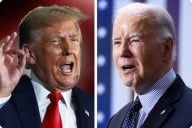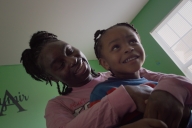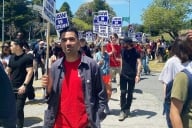You have /5 articles left.
Sign up for a free account or log in.
After the University of California, Irvine, men’s basketball team lost on Sunday, the head coach, Russell Turner, took a reporter’s question about his interactions with the opposing team’s forward, the University of Oregon’s Louis King.
Turner chuckled and replied, looking pleased, “I was saying, ‘Double-team queen,’ to try to see if I could irritate him. And I did. And I kept talking to my team about what we wanted to do. We were calling him ‘queen’ because I knew it might irritate him.”
During the game against Oregon, Turner continuously referred to King as “queen.” He went on to claim that the taunt was a metaphor for chess -- that “queen” represented King’s importance on his team, though observers said this explanation didn’t quite jibe. Wouldn’t calling him a “queen” be considered a compliment in that context?
More likely, critics said, Turner intended to belittle King with sexist and homophobic tropes. Many studies have found that anti-LGBTQ slurs are ubiquitous in sports, but not necessarily visible. This incident only brought those prejudices to light because it happened in the National Collegiate Athletic Association’s Division I men’s basketball tournament, March Madness, its most visible and lucrative event, pundits said in interviews.
After the backlash -- which included condemnations from a prominent, openly gay high school coach in the New York metro area and former hopeful for the State Assembly, and King’s mother -- Turner apologized, in a statement that has also been attacked as hollow. His statement, which the UC Irvine athletics department posted to Twitter, reads in part:
I take seriously my responsibility as a campus and community leader and I regret that my actions during the Oregon game did not meet the standard of leadership I should consistently set. For that, I apologize to the UC Irvine community, including the student-athletes and coaches of our men’s basketball program. When student-athletes on our team make mistakes, I expect them to take responsibility and to learn from their mistakes in order to improve themselves. I will do the same. I accept full responsibility for my ill-considered actions, and I will learn from this situation to be a more thoughtful coach and competitor.
Turner’s apology doesn’t address the underlying bigotry in his insult, said Russ Toomey, an associate professor of family studies and human development at the University of Arizona.
Using a gay slur against someone repeatedly -- even if the person isn't gay -- sends a message to all gay people, not just the subject to the taunt, Toomey and others said.
“To see a high-profile coach in a high-profile tournament use this language could deter [others] from participating in sports and foster a feeling of lack of safety, which may already be present -- including on the coach’s own team,” Toomey said.
Shaun Harper, an expert on intercollegiate athletics and executive director of the University of Southern California’s Race and Equity Center, said that the apology looked like it was written by the public relations staff at UC Irvine -- it was imprecise and lacking in substance.
Harper said that in his new book, Scandals in College Sports (Routledge), he documents 21 cases of coaching abuse. He found that coaches more often abuse players in the heat of the moment, rather than their behavior being premeditated.
But in Turner’s case, as Turner acknowledged in the press conference, he had already talked with the team about going after King.
“People who are hurt and affected by those words deserve to have the person who hurt them in that way take full ownership of those words,” Harper said. “You know, like, if you said them, you got to stand by them, exclusively name them, don’t run away from them now. He didn’t run away from them when he was on the sidelines.”
Toomey’s research has uncovered how common anti-LGBTQ sentiment is among college athletes. In one study, he found that only a small percentage of heterosexual athletes -- less than 10 percent -- never reported hearing a slur against one of their LGBTQ counterparts.
The same study found that 7 percent of straight athletes considered themselves LGBTQ allies and were willing to publicly share their views.
Incidents involving anti-LGBTQ language in college sports have cropped up for decades, but there’s some evidence in recent years that administrators now are more willing to harshly punish bad actors.
For instance, in 2004, North Carolina State University guard Scooter Sherrill insinuated (insultingly) that then Duke University player J. J. Redick was gay (he is not). He merely apologized and the incident blew over.
Sherrill said in an interview at the time that when Redick played, he ran “down the court hollering. He's got his hand up like he's gay or something." Then Sherrill laughed about it.
Through Lee Fowler, the athletics director at NC State at the time, Sherrill issued a bland apology, saying the remark was “uncharacteristic and unfortunate” and apologizing to “anyone who was offended.”
ESPN aired a documentary about Christian Laettner, who is straight and who played basketball for Duke from 1989 to 1992, who was hounded by rumors he was gay. During one game against Louisiana State University, the crowd screamed "faggot" at him over and over without consequence.
"It went beyond the pale, but I never said to myself that it was too much," Laettner said in an interview with GQ. "It was just perception, not the truth. I know what I am. It was really easy to let that roll off my shoulder, but at the same time, it didn't feel good. I got teased about it. I would walk into arenas and all the fans would chant it. Then I'd be on campus and the football players would say it. That wasn't cool."
More recently, in July, California Polytechnic State University revoked the scholarship of a star wrestler who was filmed screaming a homophobic slur at a rally in support of President Trump’s immigration policies.
The institution didn’t directly link the recording and its decision, but the Cal Poly athletics director acknowledged the university was aware of the video.
And infamously, Rutgers University fired men’s basketball coach Mike Rice in 2013 after a video surfaced of him screaming homophobic insults at his players. Rice’s behavior had already led the university had to fine him $50,000, suspend him for three games and order he take anger management classes.
Some online have also called for Turner’s resignation. Toomey said he doesn’t think that’s warranted, but he said that Irvine officials should hire an expert to work with Turner and the rest of athletics staffers on inclusiveness and language. He said that his research shows that when coaches demonstrate they’re pro-LGBTQ, that behavior trickles down to players.
Tom Vasich, UC Irvine spokesman, said the university had no additional comment beyond Turner’s statement.
The Oregon men’s basketball team posted a statement on Twitter saying that Turner had reached out to apologize to the King family and the athletics department for his comments.
“He reiterated they were not meant to offend,” the statement reads. “All parties accepted the apology and are moving past the issue.”
The NCAA did not provide comment.
The association has done work on these issues. It sponsors Common Ground, a think tank of both college administrators and students who develop ideas to improve LGBTQ athletes’ experiences, and it has published “Champions of Respect,” a lengthy report on gay athletes in all divisions.








